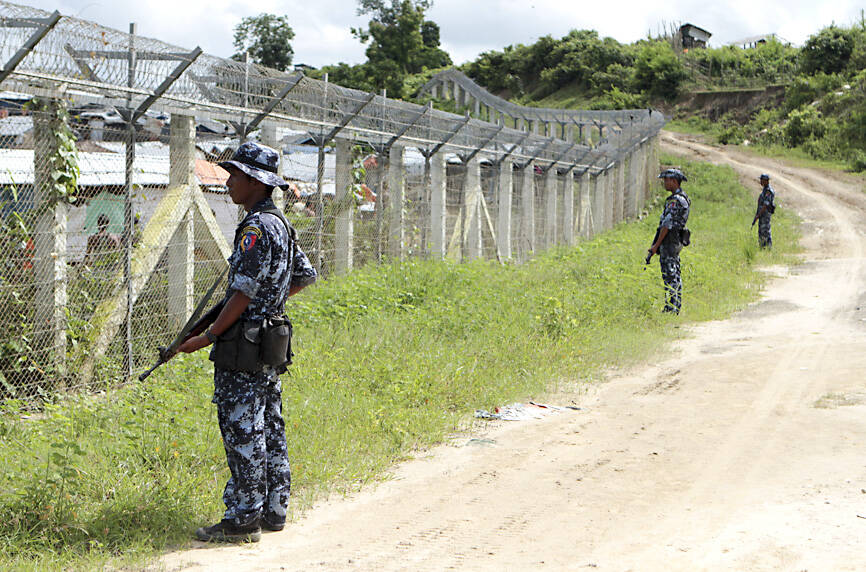One of the most powerful ethnic minority armed groups battling Myanmar’s army has claimed the capture of the last army outpost in the strategic western town of Maungdaw, gaining full control of the 271km-long border with Bangladesh.
The capture by the Arakan Army makes the group’s control of the northern part of Rakhine state complete, and marks another advance in its bid for self-rule there.
Rakhine has become a focal point for Myanmar’s nationwide civil war, in which pro-democracy guerrillas and ethnic minority armed forces seeking autonomy battle the country’s military rulers, who took power in 2021 after the army ousted the elected government of Aung San Suu Kyi.

Photo: AP
Arakan Army spokesperson Khaing Thukha told The Associated Press by text message from an undisclosed location late on Monday that his group had seized the last remaining military outpost in Maungdaw on Sunday.
Outpost commander Brigadier General Gen. Thurein Tun was captured while attempting to flee the battle, Khaing Thukha said.
The situation in Maungdaw could not be independently confirmed, with access to the Internet and mobile phone services in the area mostly cut off.
Myanmar’s military government did not immediately comment.
Maungdaw, about 400km southwest of Mandalay, Myanmar’s second-largest city, has been the target of an Arakan Army offensive since June. The group captured Paletwa and Buthidaung, two other towns on the border with Bangladesh, earlier this year.
Since November last year, the Arakan Army has gained control of 11 of Rakhine’s 17 townships, along with one in neighboring Chin state.
Ann, a town in Rakhine that hosts the strategically important military headquarters overseeing the western part of the country, appears to be on the verge of falling entirely to the Arakan Army.
The group posted on the Telegram messaging app late on Friday that it had taken more than 30 military outposts, except the army’s western command, which controls Rakhine and the southern part of neighboring Chin state, as well as the country’s territorial waters in the Bay of Bengal.
Recent fighting in Rakhine has raised fears of a revival of organized violence against members of the Muslim Rohingya minority, similar to that which drove at least 740,000 members of their community in 2017 to flee to neighboring Bangladesh for safety.
The Arakan Army, which is the military wing of the Buddhist Rakhine ethnic group in Rakhine state, where they are the majority and seek autonomy from Myanmar’s central government, denies the allegations, although witnesses have described the group’s actions to the AP and other media.
Rohingya have lived in Myanmar for generations, but they are widely regarded by many in the country’s Buddhist majority, including members of the Rakhine minority, as having illegally migrated from Bangladesh. The Rohingya face a great amount of prejudice and are generally denied citizenship and other basic rights.

The team behind the long-awaited Vera Rubin Observatory in Chile yesterday published their first images, revealing breathtaking views of star-forming regions as well as distant galaxies. More than two decades in the making, the giant US-funded telescope sits perched at the summit of Cerro Pachon in central Chile, where dark skies and dry air provide ideal conditions for observing the cosmos. One of the debut images is a composite of 678 exposures taken over just seven hours, capturing the Trifid Nebula and the Lagoon Nebula — both several thousand light-years from Earth — glowing in vivid pinks against orange-red backdrops. The new image

Canada and the EU on Monday signed a defense and security pact as the transatlantic partners seek to better confront Russia, with worries over Washington’s reliability under US President Donald Trump. The deal was announced after a summit in Brussels between Canadian Prime Minister Mark Carney and European Commission President Ursula von der Leyen and European Council President Antonio Costa. “While NATO remains the cornerstone of our collective defense, this partnership will allow us to strengthen our preparedness ... to invest more and to invest smarter,” Costa told a news conference. “It opens new opportunities for companies on both sides of the

ESPIONAGE: The British government’s decision on the proposed embassy hinges on the security of underground data cables, a former diplomat has said A US intervention over China’s proposed new embassy in London has thrown a potential resolution “up in the air,” campaigners have said, amid concerns over the site’s proximity to a sensitive hub of critical communication cables. The furor over a new “super-embassy” on the edge of London’s financial district was reignited last week when the White House said it was “deeply concerned” over potential Chinese access to “the sensitive communications of one of our closest allies.” The Dutch parliament has also raised concerns about Beijing’s ideal location of Royal Mint Court, on the edge of the City of London, which has so

With a monthly pension barely sufficient to buy 15 eggs or a small bag of rice, Cuba’s elderly people struggle to make ends meet in one of Latin America’s poorest and fastest-aging countries. As the communist island battles its deepest economic crisis in three decades, the state is finding it increasingly hard to care for about 2.4 million inhabitants — more than one-quarter of the population — aged 60 and older. Sixty is the age at which women — for men it is 65 — qualify for the state pension, which starts at 1,528 pesos per month. That is less than US$13